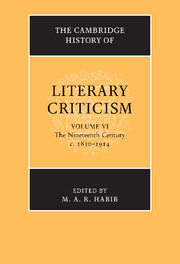Book contents
- The Cambridge History of Literary Criticism
- Series page
- The Cambridge History of Literary Criticism
- Copyright page
- Contents
- Notes on contributors
- Acknowledgements
- Introduction
- I Literary criticism as an institution
- II National developments in literary criticism
- III Critical movements and patterns of influence
- 11 Literary autonomy: the growth of a modern concept
- 12 Hegel's aesthetics and their influence
- 13 Marx, Engels and early Marxist criticism
- IV Later nineteenth-century developments: Realism, Naturalism, Symbolism and Decadence
- V Some major critics of the period
- VI Genre criticism
- VII Literature and other disciplines
- Select bibliography and further reading
- Index
11 - Literary autonomy: the growth of a modern concept
from III - Critical movements and patterns of influence
Published online by Cambridge University Press: 05 February 2013
- The Cambridge History of Literary Criticism
- Series page
- The Cambridge History of Literary Criticism
- Copyright page
- Contents
- Notes on contributors
- Acknowledgements
- Introduction
- I Literary criticism as an institution
- II National developments in literary criticism
- III Critical movements and patterns of influence
- 11 Literary autonomy: the growth of a modern concept
- 12 Hegel's aesthetics and their influence
- 13 Marx, Engels and early Marxist criticism
- IV Later nineteenth-century developments: Realism, Naturalism, Symbolism and Decadence
- V Some major critics of the period
- VI Genre criticism
- VII Literature and other disciplines
- Select bibliography and further reading
- Index
Summary
- Type
- Chapter
- Information
- The Cambridge History of Literary Criticism , pp. 231 - 250Publisher: Cambridge University PressPrint publication year: 2013
- 1
- Cited by

